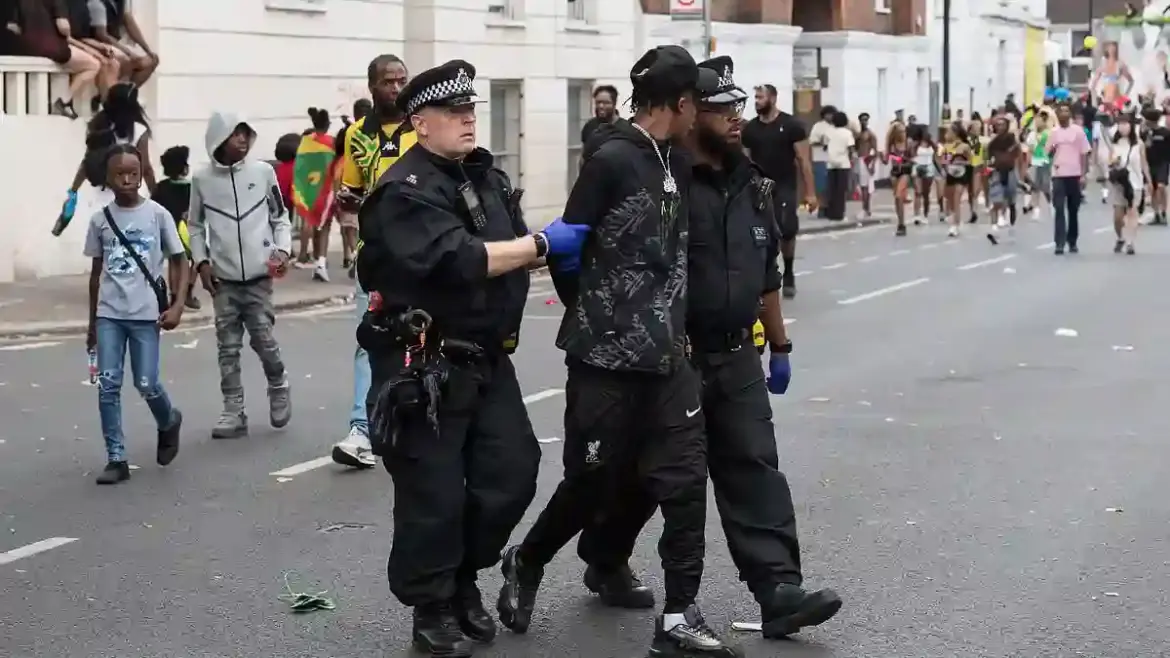The Notting Hill Carnival – Europe’s biggest street party – opened with its usual explosion of colour, music, and dancing, but the first day was marred by a surge in arrests.
Police confirmed that 140 people were detained on Sunday for a range of offences, from assaults on officers to possession of weapons and drugs.
That figure marks a sharp rise from last year’s opening day, when 104 people were arrested, and comes as the Metropolitan Police introduced tougher measures to crack down on violence and crime during the event.
Police Crackdown and New Technology
Determined to prevent a repeat of previous years’ violence, the Met deployed knife arches at entry points and live facial recognition cameras to identify individuals on watchlists.
By 8pm on Sunday, dozens of arrests had already been made – including 15 for assaults on police officers.
One officer suffered a hand injury serious enough to require hospital treatment.
Other arrests included 21 for possession of offensive weapons, 19 for intent to supply class A drugs, 25 for cannabis possession, and four for sexual offences.
Strikingly, 13 of the arrests outside the carnival area were linked directly to live facial recognition technology.
Carnival Spirit in Full Swing
Despite the heavy police presence, the carnival atmosphere was in full flow from the early hours.
Revellers kicked off celebrations at dawn with J’Ouvert – a traditional Caribbean street party marked by paint throwing and music.
People smeared in colourful powders and oil paraded through the streets, dancing on bus stops and filling the air with whistles and steel drum rhythms.
Sunday was also dedicated to children’s parades and family-friendly events, while later in the afternoon crowds paused for a 72-second silence in memory of the Grenfell Tower fire victims.
Businesses and Residents Brace Themselves
Alongside the festivities, many local businesses and residents were taking precautions.
Pubs and shops boarded up their windows, while some landlords admitted it was less about welcoming guests and more about preventing damage.
One resident, Venetia, who has Caribbean heritage, felt the event had drifted from its roots:
“It used to be about Caribbean culture and family. Now it feels more about beer, drugs, and graffiti.
It needs more organisation and a stronger cultural focus.”
Others, however, said the vibe remained positive and busy, with plenty of police patrols and security in place.
Rising Concerns Over Safety
Safety remains a hot-button issue. Police officers have voiced worries about crowd density, fearing the risk of a crush similar to the Hillsborough disaster.
Videos from previous years show waves of people moving as one mass, leaving both officers and partygoers vulnerable.
Simon Hill of the Metropolitan Police Federation explained that officers, especially women, have reported assaults and feel at risk in such densely packed crowds.
“They don’t go to work to be sexually assaulted,” he said, stressing that both police and the public face dangers from overcrowding.
Calls to Move the Carnival
The debate over location continues to grow louder.
While the carnival is rooted in Notting Hill’s cultural history, some suggest moving it to Hyde Park, where crowd numbers could be ticketed and managed more safely.
A park setting, supporters argue, would also reduce issues like public urination in residential gardens and damage to property.
London Mayor Sadiq Khan has already voiced concerns about crush risks, while some locals complain of rising disorder year after year.
Police and Organisers Pledge Change
In response, organisers insist they have worked closely with police to improve safety this year.
Measures include better CCTV coverage, more trained stewards, faster response systems, and enhanced crowd management infrastructure.
Matthew Philip, CEO of Notting Hill Carnival, said:
“These aren’t just tick-box exercises. They are real commitments to community protection, run by experts who care about the event and its people.”
Carnival’s Long Legacy
The Notting Hill Carnival has been a London tradition since 1966, celebrating Caribbean culture through music, food, dance, and costume.
But the event has also been dogged by rising arrest figures and outbreaks of violence.
Despite the challenges, millions continue to flock to west London each year to take part in what remains one of the city’s most iconic celebrations – a vibrant mix of joy, heritage, and, unfortunately, controversy.



